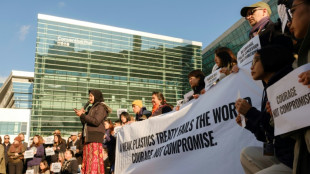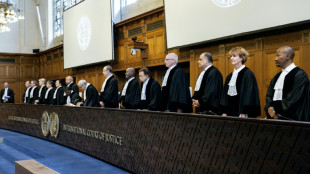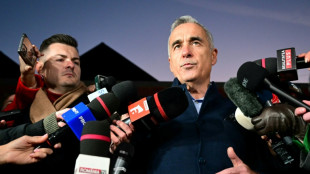
-
 Days before deadline, plastic treaty draft highlights disagreement
Days before deadline, plastic treaty draft highlights disagreement
-
Crypto boss eats banana art he bought for $6.2 million

-
 Teen news boss criticises Australian social media ban
Teen news boss criticises Australian social media ban
-
Taiwan detects 41 Chinese military aircraft, ships ahead of Lai US stopover

-
 Spain urged to 'build differently' after deadly floods
Spain urged to 'build differently' after deadly floods
-
WTO chief faces heavy task as Trump threat looms

-
 Herbert takes control at Australian Open as Smith tanks
Herbert takes control at Australian Open as Smith tanks
-
Israel PM again warns Iran after top diplomat talks of revising nuclear doctrine

-
 Brilliant Brook's 132 puts England on top against sloppy New Zealand
Brilliant Brook's 132 puts England on top against sloppy New Zealand
-
Brilliant Brook's 132 puts England on top against New Zealand

-
 US landmine offer to Ukraine throws global treaty into 'crisis': campaign group
US landmine offer to Ukraine throws global treaty into 'crisis': campaign group
-
Singapore hangs 4th person in three weeks

-
 Five things to know about NewJeans' shock split from agency
Five things to know about NewJeans' shock split from agency
-
Waste pickers battle for recognition at plastic treaty talks

-
 Ireland votes in closely fought general election
Ireland votes in closely fought general election
-
Top UN court to open unprecedented climate hearings

-
 European countries that allow assisted dying
European countries that allow assisted dying
-
British MPs to debate contentious assisted dying law

-
 Schmidt not expecting hero's welcome on Ireland return
Schmidt not expecting hero's welcome on Ireland return
-
PSG stuck between domestic dominance and Champions League woes

-
 'Hot fight' as unbeaten Bayern visit Dortmund fortress
'Hot fight' as unbeaten Bayern visit Dortmund fortress
-
Bordeaux-Begles' Samu 'not finished yet' with Wallabies

-
 Brook and Pope half-centuries haul England to 174-4 against NZ
Brook and Pope half-centuries haul England to 174-4 against NZ
-
Yen rallies on rate hike bets as equity markets swing

-
 Ukraine superstar Mahuchikh brings 'good vibes' to her war-torn country
Ukraine superstar Mahuchikh brings 'good vibes' to her war-torn country
-
PlayStation at 30: How Sony's grey box conquered gaming

-
 Saudi Arabia hosts UN talks on drought, desertification
Saudi Arabia hosts UN talks on drought, desertification
-
PlayStation: Fun facts to know as Sony's console turns 30

-
 Nepal's first transgender candidates run for local office
Nepal's first transgender candidates run for local office
-
Father of PlayStation says 'everyone told us we would fail'

-
 Ireland seek to overcome former coach Schmidt's Wallabies
Ireland seek to overcome former coach Schmidt's Wallabies
-
Detroit survive Bears comeback to make it 10 wins in a row

-
 Mexican actor Silvia Pinal dead at 93
Mexican actor Silvia Pinal dead at 93
-
'Black Friday' deals target inflation-weary US consumers

-
 Liverpool look to deepen Man City crisis, Amorim seeks first Premier League win
Liverpool look to deepen Man City crisis, Amorim seeks first Premier League win
-
Police fire rubber bullets, tear gas at Georgia protesters after PM delays EU bid

-
 England lose three quick wickets in reply to New Zealand's 348
England lose three quick wickets in reply to New Zealand's 348
-
Social media companies slam Australia's under-16 ban

-
 Police fire tear gas at Georgia protesters after PM delays EU bid
Police fire tear gas at Georgia protesters after PM delays EU bid
-
Canada watchdog sues Google over 'anti-competitive' ad tech

-
 Hojlund gives Amorim winning Old Trafford bow, Roma hold Spurs
Hojlund gives Amorim winning Old Trafford bow, Roma hold Spurs
-
Amorim wins first Man Utd home game after rollercoaster ride

-
 France arrests 26 as South Asian migrant trafficking ring smashed
France arrests 26 as South Asian migrant trafficking ring smashed
-
At least 15 dead, 113 missing, in Uganda landslides

-
 Netanyahu threatens 'intensive war' if Hezbollah breaches fragile truce
Netanyahu threatens 'intensive war' if Hezbollah breaches fragile truce
-
Bilbao join Lazio at Europa League summit, Chelsea cruise in Conference League

-
 In Lebanon's Tyre returning residents find no water, little power
In Lebanon's Tyre returning residents find no water, little power
-
Protests in Georgia after PM delays EU bid to 2028

-
 Biden slams Trump tariff threats as 'counterproductive'
Biden slams Trump tariff threats as 'counterproductive'
-
TikTok tactics shake up politics in Romania


Four things to know about Kenya's vote dispute
Kenya's Supreme Court on Friday wrapped up hearing three days of oral arguments in the case challenging the validity of the August 9 presidential election won by Deputy President William Ruto.
His 77-year-old opponent Raila Odinga, who lost his fifth stab at the presidency, insists the election results were manipulated and claims to have "enough evidence" to prove his case.
With the seven-judge bench set to hand down its decision on Monday -- the constitutional deadline -- here are some key questions about the case and its potential implications for the country.
- How did we get here? -
The Independent Election and Boundaries Commission (IEBC) proclaimed 55-year-old Ruto president-elect on August 15 after a nail-biting wait for results.
Odinga lost by a wafer-thin margin of around 230,000 votes despite the support of his old foe and outgoing President Uhuru Kenyatta, and the weight of the ruling party machinery behind him.
The former prime minister cried foul over the outcome, which also triggered turmoil within the IEBC.
No presidential poll outcome has gone uncontested in Kenya since 2002, and Odinga himself has been down this road before, petitioning the court in 2013 and 2017.
In August 2017, the Supreme Court annulled the election after Odinga rejected Kenyatta's victory.
The IEBC was under intense pressure to produce a transparent vote after facing stinging criticism over its handling of the 2017 election.
- What are the complaints? -
Seven petitioners -- whose cases have been collapsed into one -- have alleged that there were massive irregularities that compromised the integrity of the vote.
Odinga's 72-page petition claims that hackers broke into the IEBC servers and "converted, manipulated and unlawfully" dumped forms used to tabulate results from polling stations.
He alleges that the IEBC released contradictory figures on voter turnout and failed to tally results from at least 27 of the 290 constituencies, arguing that Ruto did not therefore meet the constitutional threshold of 50 percent plus 1 of the valid votes cast.
The court, led by Chief Justice Martha Koome, said it had identified nine issues to consider before arriving at a verdict.
Judges will attempt to figure out whether the IEBC website was hacked and if there was any interference with the transmission of result forms.
They will also scrutinise the IEBC's servers to ascertain if the election technology -- a hot-button issue that led to the nullification of the August 2017 vote -- met the "standards of integrity, verifiability, security and transparency".
IEBC chairman Wafula Chebukati has denied the allegations, insisting he carried out his duties according to the law of the land despite facing "intimidation and harassment".
- What next? -
There are three possible outcomes.
If the court finds substantial irregularities that could have seriously affected the results announced by the IEBC, it can nullify the election and order a new vote within 60 days.
Alternatively, it can criticise the electoral process but conclude that the irregularities do not merit an annulment.
If it nonetheless finds that the president-elect did not secure 50 percent plus 1 of valid votes, it will order a runoff, which must be held within 30 days, marking a first for Kenya.
Finally, it can uphold Ruto's victory, allowing him to be sworn in on September 13.
The court's ruling will be decided by a majority vote.
The Supreme Court is the highest in the land, created under Kenya's 2010 constitution "as the final arbiter and interpreter of the constitution".
Its rulings are final and binding.
- What's at stake for Kenya? -
Plenty.
The aftermath of the poll and court decision is being keenly watched as a test of democratic maturity in the East African powerhouse.
While Kenya is considered a pillar of stability in a volatile region, there are fears a drawn-out dispute may trigger violence in a country with a history of post-poll unrest.
Kenya's worst electoral violence occurred after the 2007 vote, when more than 1,100 people died in politically motivated bloodletting between rival tribes.
A prolonged electioneering period will also exacerbate already difficult economic conditions, with business likely to slow down in the midst of political uncertainty.
The country is struggling with soaring prices, a crippling drought that has left millions hungry, endemic corruption and disenchantment with the political elite.
M.Odermatt--BTB
